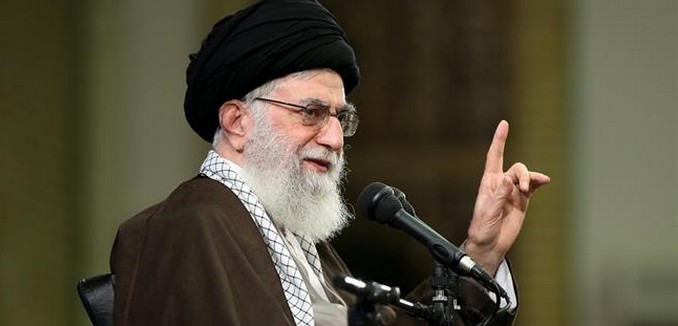Iran is threatening to retaliate against sanctions legislation that was overwhelmingly passed by the House of Representatives last week, shortly after the Institute for Science and International Security reported that Iran may be in violation of elements of last year’s nuclear agreement.
“So far, the current US government has committed several violations with regard to the nuclear agreement,” Iranian Supreme Leader Ayatollah Ali Khamenei said on Wednesday, according to the semi-official Iranian news site PressTV. “The most recent of them is the 10-year extension of the sanctions. If these sanctions are extended, it will surely constitute a violation of the JCPOA and they (the US) should know that the Islamic Republic will definitely react to it.”
The Iran Sanctions Act, which passed the House by a margin of 419 – 1 last Tuesday, seeks to extend sanctions imposed on Iran due to its widespread support of terrorism and give the president authority to reimpose nuclear sanctions if Iran breaches the nuclear pact. The International Atomic Energy Agency, the United Nations’ nuclear watchdog, confirmed days later that Iran had exceeded its limits on stockpiling heavy water — an element used in the construction of nuclear weapons — for the second time since signing the deal.
Khamenei’s threat echoed one made last week by Ali Shamkhani, secretary of Iran’s Supreme National Security Council. “If you extend the sanctions, this will mean kicking the JCPOA away and we will confront it through implementing powerful technical packages,” Shamkhani said. He didn’t explain what he meant by “powerful technical packages.”
Notably, the U.S. sanctions legislation, if passed by the Senate and signed into law by the president, will not impose new nuclear sanctions on Iran. It would therefore not violate the deal, contrary to Iranian assertions.
However, the Institute for Science and International Security explained in its analysis of the IAEA’s most recent compliance report that Iran may be in violation of the accord. The institute noted that Iran exceeded the deal’s 130 metric ton limit on heavy water, and that “nowhere in the report does the IAEA state that Iran is fully compliant with the JCPOA.”
The institute also found that the IAEA was unclear about Iran’s adherence to other terms of the agreement, which it said raises doubts about Iran’s overall compliance. It argued that these concerns were reinforced by the “overly secretive nature” of the discussions of the Joint Commission, which determines whether or not Iran is abiding by the deal.
It noted, for instance, that the IAEA found that Iran’s stockpile of low enriched uranium (LEU) was below the 300 kilogram limit, but that the IAEA’s assessment may be overly generous in its determination of how much LEU is “unrecoverable,” which may render it “inaccurate.”
The institute also pointed out that Iran has used advanced centrifuges not just for enriching uranium, but also for stable isotope production. It isn’t clear if Iran is allowed to use the advanced centrifuges at this point for either project.
The chief selling point of the nuclear deal is that it extended Iran’s breakout time — the time required to produce enough nuclear material for a bomb — to a year. If Iran is violating the caps on heavy water or LEU, or using faster centrifuges than those allowed by the deal, the breakout time would be reduced.
“The continued lack of information in the IAEA reports combined with the ongoing secrecy surrounding the decision-making of the Joint Commission is a serious shortcoming in the implementation of the JCPOA and raises legitimate questions about the adequacy of Iran’s compliance,” the institute wrote.
In contrast to Iran’s violations of elements of the nuclear deal, the United States has adhered to its terms, which would not be breached by the Iran Sanctions Act.
Top White House officials, including President Barack Obama, have previously affirmed that the U.S. would maintain sanctions on Iran for its support of terror, its ballistic missile program, and its human rights violations, even after the nuclear deal.
On August 15, 2015, Obama said that the U.S. would uphold “sanctions targeting Iran’s support for groups such as Hizballah, its destabilizing role in Yemen, its backing of the Assad regime, its missile program, and its human rights abuses at home.” In testimony before the Senate Foreign Relations Committee in July 23, 2016, Treasury Secretary Jack Lew said that the Obama administration would “continue to wield” sanctions imposed on Iran for “its active support for terrorism, its ballistic missiles program, destabilizing regional activities, and human rights abuses.” At the same hearing, Secretary of State John Kerry insisted that “U.S. sanctions related to human rights, terrorism, and ballistic missiles will remain in place.”
At a Senate hearing in July 2015, Kerry was emphatic that Iran was in agreement that within the framework of the nuclear deal, the United States could impose and maintain non-nuclear sanctions against Iran.
But they are clear and we are clear that we have all other kinds of authorities and let me specific on that because it’s important for this whole debate to be clear. Even with the lifting of sanctions after eight years on missiles or five year on arms are the UN sanctions. It’s only the UN sanctions. We still have sanctions. Our primary embargo is still in place. We are still sanctioning them. And, I might add, for those things that we may want to deal with because of their behavior, for instance, Hezbollah, there is a UN resolution, 1701, the prevents the transfer of any weapons to Hezbollah. That will continue and what we need to do is make sure that we’re enforcing it.
[Photo: PressTV ]




